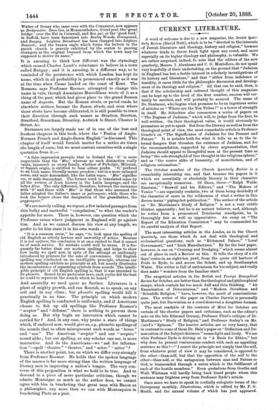The most readable of the contents of Mind for October
are certain of the shorter papers and criticisms, such as the editor's note on the late Edmund Gurney, Professor Flint's critique of Dr. Martineau's "Study of Religion," and Professor Sorley's on Mr. Caird's "Spinoza." The heavier articles are so very heavy, that in contrast to some of them Dr. Bain's paper on "Definition and De- marcation of the Subject-Sciences "seems light and lively. We see what Professor Dyde is driving at in "A Basis for Ethics," but why does he present venturesome readers with such an appalling sentence as this ?—" I assert the principle not simply that the self, from whatever point of view it may be considered, is opposed to the other—than-self, but that the opposition of the self to the other—than-self, or the antagonism between man and Nature or God, is transcended through a union which is the fulfilment of each of the hostile members." Even quotations from Goethe and Walt Whitman will hardly bring back timid people whom this sentence may frighten away from Professor Dyde's article.


































 Previous page
Previous page